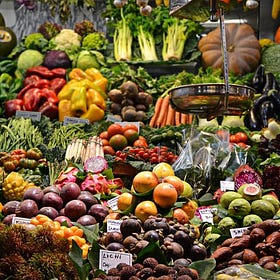It's Always Better To Clear Our Intestines Regularly Than Never.
We’d have much less noxious smells and toxic biochemical metabolites to deal with, that is for sure!
The unsung garbage collectors in our communities have this really thankless role to fulfil. They have to go from household to household to collect waste — all the stuff that we don’t want to keep at home any more and decide that it’s time to get rid of.
Because we do know that accumulated waste, rubbish heaps and rotting food scraps all pose fantastic breeding grounds for disease-causing microorganisms and other associated pests.
Even in supermarkets. If a clumsy customer knocks a bottle of sauce off the shelf such that the bottle breaks and causes a mess on the floor, one of the staff members would have to respond to the mess and clear it up swiftly. Nobody’s going to say that we can leave the sauce on the ground for the next few days — it’s unsightly and it’s going to smell bad.
Question being: Why don’t we think about that clearance mechanism in our bodies?
It’s more a matter of out of sight, out of mind. We don’t see our bodies creating a mess internally. We’d be more concerned about having to clean tthe toilet bowls after leaving them filled the waste that we actually do excrete.
But as food scraps can attract pests and vermin and other unwanted microorganisms when they aren’t cleared and disposed of in a timely fashion, then what happens in our bodies when similar waste materials aren’t eliminated in a timely fashion as well?
An accumulation of negative emotions in a person would lead to them feeling unwell in various aspects of life. An accumulation of biochemical “trash” would lead them to feel unwell physically, too.
It’s not just the accumulation of “trash”, but what other microorganisms can do with that “trash”. We can see what happens with overripe fruits — they tend to become more mushy, their solid contents get consumed by the microorganisms feasting on them, and they turn into this fetid, rotten, watery-ish mess that we wouldn’t even want to touch.
The microorganisms feeding on them would thrive in such an environment, and unfortunately some of these microorganisms also do revel in bringing about disease and illness — which is why we don’t want to eat rotten fruits, for instance.
What The Microorganisms In Our Gut Can Do To The Biochemistry In The Body
Our intestines are long, and they contain a big load of live bacterial microorganisms — approximately 100 trillion of them at any one time.
In our bodies, we don’t have rotten food per se, but we do have food that we do eat in our daily diets, which goes through our digestive systems and out as either urine or faecal matter. A nice steak gets transformed into a smelly mass of fecal matter after the body is done with processing and removing most of the nutrients from it.
The fecal matter that we humans produce has to be processed by the sewage system, especially in large cities that deal with tons of such matter from their human populations. If the sewage system cannot handle all this poo, we’d be seeing the discharge of all the pathogen-laden untreated sewage into local waterways, which would be even more harmful to the population in that area.
Now imagine what happens if our bodies can’t get rid of all that fecal matter in our digestive systems. We call that constipation, no?'
We’d be holding on to those toxins in our body for far too long.
Much like how people who cling to unhealthy emotions or beliefs can find themselves in terribly unhealthy situations as well.
While something may be good, too much of something isn’t necessarily good. People can get water poisoning by drinking too much water, for instance.
The same reasoning goes with the accumulation of cholesterol in our blood:
The Problem With Cholesterol Accumulation In Our Body.
This piece is a continuation from It Ain’t Really Just The Cholesterol That Contributes To Heart Disease:
We’d be poisoning ourselves slowly from the inside.
That, too, isn’t good.
And that’s just solid waste.
What about liquid waste?
Sometimes we’re working or on the move, and we don’t even have time to stop and take a quick pee.
All that accumulation of toxins and divalent ions in the urine can be problematic to the chemical equilibria in our bodies.
For example, we do excrete calcium ions in our urine. The kidneys reabsorb quite a fair bit of that from the urine before we do pee it out.
What would happen if we delay our urinary frequencies such that we start to reabsorb more calcium ions? Or if we were just too busy to drink sufficient water? The Mayo Clinic has this to say:
Often, stones form when the urine becomes concentrated, allowing minerals to crystallize and stick together.
And that’s precisely why we should be concerned about frequent and timely waste disposal from our bodies!
We do have proper detoxification mechanisms and clean up crews in our body that help to support waste elimination from our body. Let’s make use of them wisely.
What Nutrients Support Digestion And Detox In Our Body?
The digestion of any food or other substances that we ingest, as well the subsequent elimination of these products from our digestive system undergoes a relatively complex mechanism.
Do feel free to share this article and hit the “subscribe” button to get more updates about the science concepts in nutrition and health, all deconstructed nicely for your convenient perusal!





